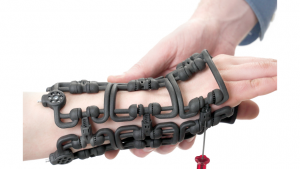
Dr. Homayoon Kazerooni says less is more when it comes to cutting edge robotics. He is the brains behind the Phoenix, the world’s lightest and most advanced exoskeleton designed to help people with mobility disorders to be upright and mobile. According to an article published by FastCo Design, the Phoenix is a 27-pound, $40 000 robot frame that allows users with disabilities to do the basic things that their conditions may deny them.
"We want to give a minimal amount to the user to be independent. We’re not saying this is a complete [mobility] machine, but if we come up with something that’s robust and simple—walks, stops, sits, and stands—that’s hugely enabling," Kazerooni was quoted as saying.
The suit was created by US-based company SuitX, which was founded by Kazerooni and a group of his PhD students in 2013. In developing the suit, Kazerooni sought to strip it of complicated robotics and instead focused on biomechanics. This makes the suit unique to exoskeletons currently on the market. With a focus on the natural movement of the human knee, the Phoenix is built to be comfortable in daily tasks like sitting or standing rather than obstacle courses or other strenuous activities.
The user still needs crutches or a walker to balance but, by limiting the amount of things the suit could do, Kazerooni managed to develop a light, affordable model. Although, he believes it still isn’t cheap enough: "I still think $40,000 is way too expensive," he says. "You can buy a motorcycle for $10,000! All that technology in there? That’s amazing! You can buy a Hyundai car for $15,000!"
He is also planning to further scale down the price over the next two to three years. It goes on the market for $40 000 next month and has already been awarded two National Science Foundation awards.
Kazerooni is currently working on a way to adapt the system for children. To this aim, SuitX has submitted a proposal to UAE Robotics and Ai Award for Good International Competition for the development of an affordable exoskeleton targeting children with neurological disorders. The proposal has since been chosen as a one of 20 semi-finalists for the AED 4.67 million award.
According to Kazerooni, the funding from the award will not only be used to conduct research to identify and create the basic principles for the development of exoskeletons for children, but also to donate 10 exoskeletons to rehabilitation centers worldwide.
“We believe the project cost would be about US$5 million. While the cost of the technology itself might be higher than available methods, we believe that with our device, children will learn to walk and walking is priceless! This can change the entire future of the child. In the longer term, it will reduce the cost of care of the child even into adulthood, which will reduce the cost on the family and society in general,” he added.
The competition finals, as well as a live demonstration is currently underway in Dubai.






